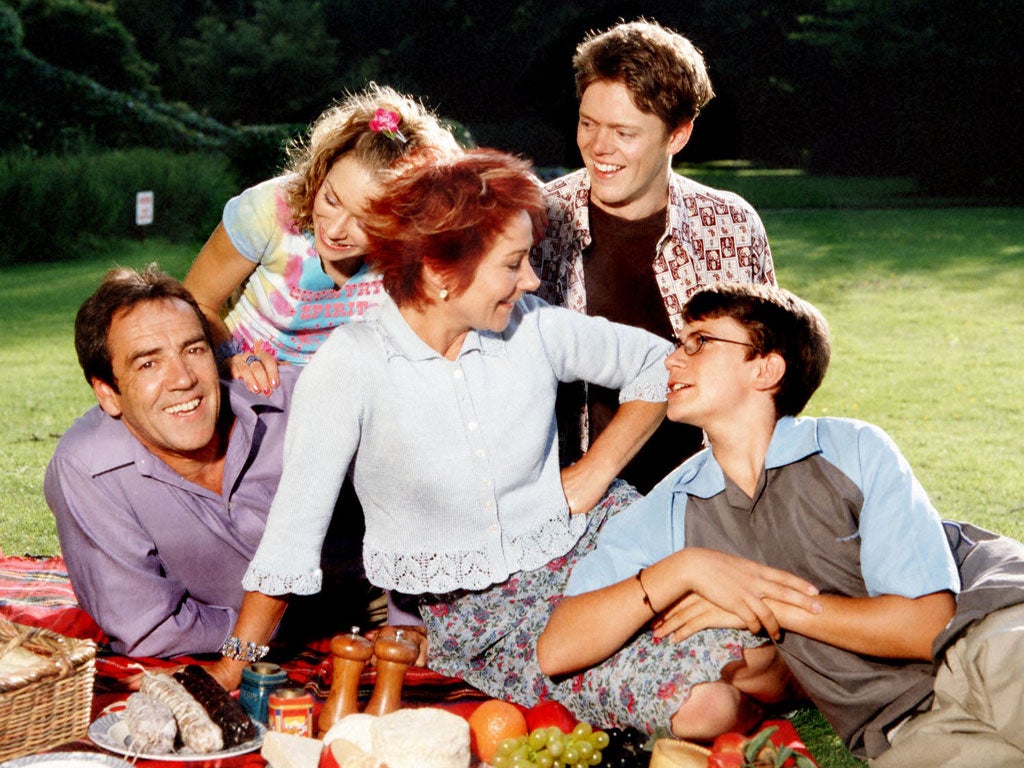Alice Jones: Forget about 'middle-class' and 'working-class'. Either comedy is funny, or it's not
Notebook

Cor lummy and strike a light, the working classes are hilarious, aren't they? With their funny accents and their flat caps and their jobs and everything. At least that's what Danny Cohen thinks.
The BBC1 controller is apparently on the hunt for more working-class comedy heroes in an effort to reconnect with core viewers who may be feeling alienated by too many sitcoms featuring jokes about John Lewis and hummus.
This week, Zoë Wanamaker complained that My Family, the long-running sitcom in which she played the skittish wife and mother to a bumbling dentist husband and a brood of relentlessly irritating children, was axed last year in an anti-bourgeois move.
"All I got told was that the BBC didn't want to have any more middle-class sitcoms," she said in an interview on BBC4's Mark Lawson Talks to ..., "which was kind of shooting yourself in the foot really, as a statement, because along comes Miranda Hart, who is the most wonderful... and she is not exactly working class."
The unkind way to read this is to say that My Family most likely got the chop because, 11 long series in, it was about as funny as root canal work. As Wanamaker points out, the great BBC purge of the Humorous Middle Classes has not gone too well so far. Miranda, starring Hart, a jolly hockey sticks boarding-school gal and daughter of a naval officer, is the very essence of middle-class larks. Some of the best comedies of recent times – Rev, Grandma's House and Gavin and Stacey – have in common a broadly middle-class setting.
They also have in common the fact that they are funny, and lots of people watch and enjoy them. Just as lots of people have watched and enjoyed Steptoe and Son, Only Fools and Horses or The Royle Family over the years. Comedy goes in cycles. Setting out with a BBC checklist to find new Del Boys or Terrys and Bobs is a mission doomed to plummet like a lead balloon. If making successful sitcoms was a matter of ticking off a formula, writers could simply include a character falling through a bar in every episode and we'd all be laughing for the rest of eternity. Come to think of it, Miranda does pretty much that week in, week out but that's the exception. Most good comedy is a far more mercurial mix.
The larger question is whether class should even come into the notion of what makes good television. Cohen's quest seems to suggest that only middle-class types can laugh at middle-class types, while working-class folk, presumably, stare on in oafish mystification. Where does that leave the masses who daringly cross class borders with their remote control, flitting from Downton Abbey to Albert Square? You don't need to be an Essex girl or a trustafarian to relish TOWIE and Made in Chelsea equally. And you don't need to identify personally with a story to be drawn in to it, or to find it amusing. Funny is funny. It's the class of the punchlines, not the characters, that matters.
Not the way to spread happiness
I had been feeling quite sorry for the British high street. The woeful weather must be playing havoc with sales of disposable barbecues, Pimm's and flip-flops. And then I saw it – sitting there, all sweet and innocent, in the fridge at Marks & Spencer, with a host of other gaudy, Jubilee-themed picnic foods. It was a jam sandwich. And not just a jam sandwich. A jam sandwich with a price tag of £1.50.
One could, of course, buy a loaf and a whole jar of strawberry seedless for the same price. What's really odd, though, is that M&S has already tried to foist this humble treat on us once. In 2009, it launched its Simply... strawberry jam sandwich, a lunchtime snack whose magic recipe combined two sugary clichés – it's credit-crunch busting and nostalgia boosting! – in one neat triangular box. It was ditched six months later after poor sales. Back then, the sandwich cost 75p. Now it costs twice that. Which either means that things are far worse than we thought on the British high street or that M&S thinks that we're daft. Either way, it's a taste of the double dip to do without.
Spartacus is made for the Turner Prize
Thank heavens for Spartacus Chetwynd. Not a sentence one gets to write very often. It must be, though, what the Turner Prize team is thinking. Once again, people are tut-tutting and eye-rolling about contemporary art's annual circus – and they haven't even brought out the streaker in a tutu yet.
Chetwynd, who changed her name to Spartacus by deed poll, makes trippy videos featuring her weird friends and Jabba the Hut and, but of course, lives in a nudist colony in south London, is the ideal Turner Prize nominee. So much so that it wouldn't be a surprise to find out that she is in fact a conceptual performance piece by Martin Creed, making a sneaky attempt at a second win. But is it art? The Turner Prize can't help with the answer to that. As Charles Saatchi puts it rather waspishly in his new book: "All anybody needs to know about prizes is that Mozart never won one."

Join our commenting forum
Join thought-provoking conversations, follow other Independent readers and see their replies